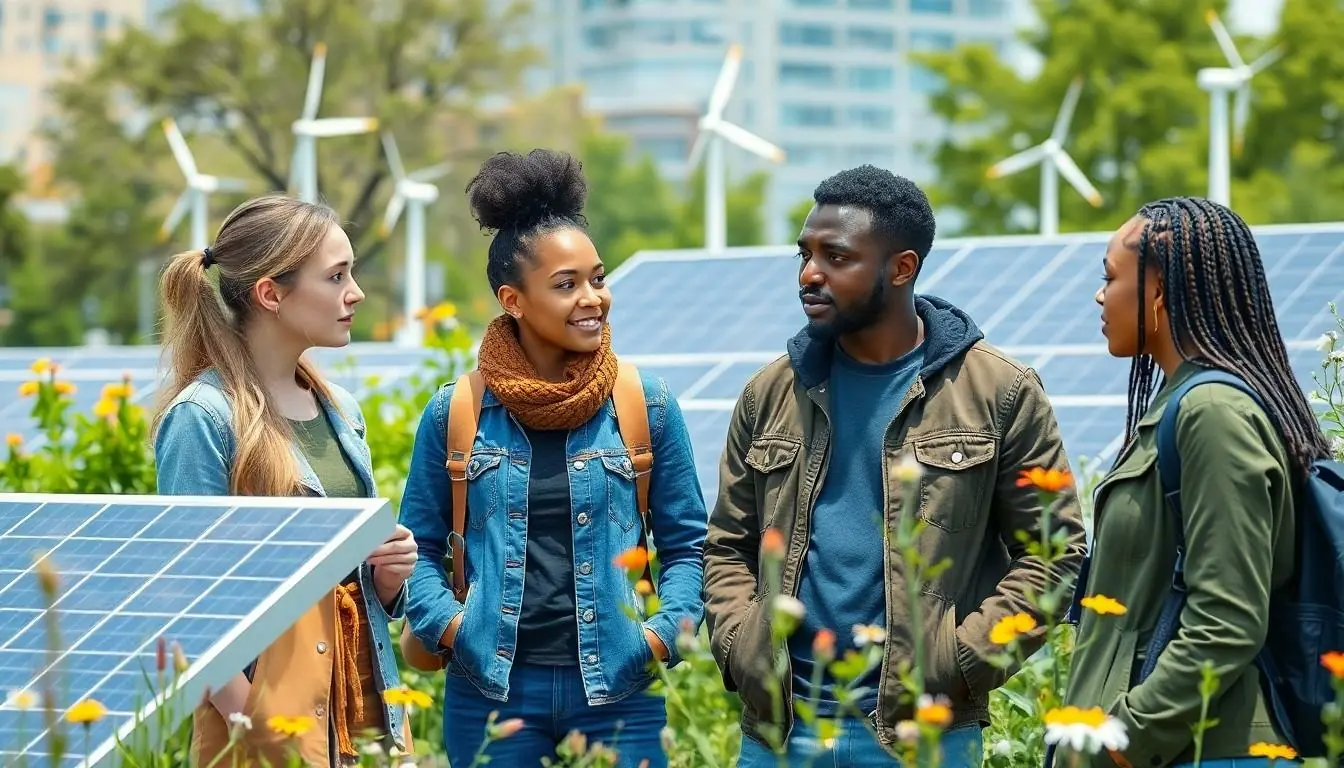In a world where climate change isn’t just a buzzword but a reality, pursuing an environmental sustainability degree could be the smartest move anyone can make. Imagine diving into a field that not only promises a fulfilling career but also helps save the planet—talk about a win-win! With every lecture and project, students aren’t just learning; they’re becoming superheroes in the fight against environmental destruction.
Picture this: armed with knowledge about renewable energy, conservation strategies, and sustainable practices, graduates step into roles that can influence policy, drive innovation, and inspire communities. Plus, they get to say they’re saving the world while wearing their favorite hoodie. Who wouldn’t want to be part of that mission? So, if you’re ready to turn your passion for the planet into a career, an environmental sustainability degree might just be your golden ticket.
Table of Contents
ToggleOverview of Environmental Sustainability Degree
An environmental sustainability degree equips students with essential skills to address ecological challenges. Programs typically cover topics such as renewable energy, conservation practices, and sustainable agriculture. Coursework integrates scientific principles and policy frameworks, preparing graduates for various roles in environmental fields.
Many institutions offer both undergraduate and graduate degrees in environmental sustainability. A bachelor’s degree often provides foundational knowledge, while a master’s degree allows for specialization in areas like climate policy or ecological restoration. Certificates in sustainability also exist, catering to professionals seeking to enhance their expertise.
Hands-on experience is a critical component of these programs. Internships and fieldwork enable students to apply theoretical knowledge to real-world scenarios. Network connections with industry leaders often arise during these practical experiences, fostering job opportunities upon graduation.
Careers associated with an environmental sustainability degree are diverse. Graduates may work as environmental scientists, policy analysts, or conservation specialists. Some professionals focus on educating communities about sustainable practices, while others engage in corporate sustainability initiatives.
The job market for sustainability-related professions is expanding. According to the U.S. Bureau of Labor Statistics, the employment of environmental scientists and specialists may grow by 8 percent from 2020 to 2030, reflecting the increasing emphasis on environmental protection and sustainability efforts.
Pursuing an environmental sustainability degree opens doors to impactful careers. This degree not only provides critical knowledge but also cultivates a commitment to promoting sustainable practices that benefit the planet.
Importance of Environmental Sustainability

Environmental sustainability holds significant value in today’s society. Not only does it address pressing environmental issues, but it also lays the groundwork for future generations.
Role in Climate Change Mitigation
Addressing climate change remains a priority for policymakers and individuals alike. An environmental sustainability degree equips graduates with necessary tools to analyze and develop strategies for reducing greenhouse gas emissions. They study renewable energy sources, fostering the adoption of solar, wind, and hydroelectric power. Understanding biodiversity helps them implement conservation efforts that protect vulnerable ecosystems. With expertise in policy frameworks, graduates can influence legislation that promotes environmental stewardship. Their work can lead to substantial reductions in carbon footprints, directly contributing to climate change mitigation efforts.
Impact on Community Development
Community development flourishes through sustainable practices. Graduates skilled in environmental sustainability play crucial roles in creating eco-friendly urban spaces. They collaborate with local organizations to promote sustainable agriculture, enhancing food security while minimizing environmental impacts. Education initiatives organized by these professionals raise awareness about the importance of conservation and renewable resources. Additionally, involvement in community planning often results in improved public health and green spaces. Sustainable community development fosters resilience against climate change. The contributions of these graduates impact economic stability and societal well-being, leading to healthier, more connected communities.
Curriculum and Learning Outcomes
Environmental sustainability degree programs offer a comprehensive curriculum designed to equip students with valuable skills. Courses explore foundational principles of ecology, economics, and social sciences relevant to sustainability challenges.
Core Subjects and Specializations
Core subjects include environmental science, sustainable development, and renewable energy systems. Students engage with topics such as climate policy, ecological restoration, and environmental ethics. Specializations might cover areas like waste management, urban sustainability, and environmental communication, allowing learners to focus on specific interests. Graduates emerge with a well-rounded understanding of interdisciplinary approaches, essential for addressing complex environmental issues.
Practical Experience Opportunities
Practical experience opportunities play a crucial role in environmental sustainability education. Internships in governmental agencies, non-profit organizations, and private sector companies provide hands-on learning. Fieldwork experiences allow students to apply theoretical knowledge to real-world challenges. Involvement in community projects fosters connections with local organizations dedicated to sustainability. Such internships enhance employability while cultivating skills that contribute to effective environmental practices.
Career Opportunities for Graduates
Graduates with an environmental sustainability degree find numerous career paths available to them. These roles involve addressing critical environmental challenges and implementing sustainable practices across various sectors.
Job Roles and Responsibilities
Environmental scientists assess ecosystems, focusing on issues like pollution and resource management. Policy analysts develop strategies that promote environmental regulations and sustainability initiatives. Conservation specialists work on habitat preservation, ensuring biodiversity protection. Sustainability coordinators implement green practices within organizations, aiming to reduce carbon footprints. Eco-consultants provide expert advice to businesses on improving sustainability efforts. Each position plays a vital role in fostering a healthier planet through informed decision-making.
Potential Employers and Industries
Various sectors employ graduates with an environmental sustainability degree, including governmental agencies that focus on environmental protection. Non-profit organizations actively promote sustainability through community outreach and advocacy. Corporations increasingly seek sustainability professionals to enhance corporate responsibility strategies. Educational institutions hire specialists to develop sustainability curricula and programs. Consulting firms provide advice to businesses on sustainable practices, exploring eco-friendly innovations. Each industry contributes to creating lasting positive impacts on the environment.
Challenges in the Field
Environmental sustainability graduates face various challenges. Rapidly changing climate conditions often require urgent responses. Adapting to emerging challenges is essential for success in this field.
Current Trends and Future Prospects
The demand for sustainability professionals increases as awareness grows. Recent studies show that employment for environmental scientists and specialists may expand by 8% from 2020 to 2030. Organizations prioritize renewable energy and waste reduction initiatives. They also seek innovative solutions to combat climate change, creating more opportunities. Graduates pursuing careers in policy advocacy or carbon management find themselves in high demand. Collaborative efforts among governments, businesses, and non-profits drive progress in sustainability practices.
Addressing Misconceptions About the Degree
Misunderstandings about environmental sustainability degrees persist. Some believe that the focus lies solely on environmental science, overlooking essential policy and social science components. This degree incorporates comprehensive strategies to address ecological issues effectively. Graduates can work not only as scientists but also as advocates, educators, and managers. Many assume the degree limits career paths to non-profits, but opportunities exist across multiple sectors, including corporate and governmental roles. Clarifying these misconceptions helps attract more individuals to pursue a career dedicated to environmental stewardship.
Pursuing an environmental sustainability degree opens doors to impactful careers that contribute to a healthier planet. Graduates are equipped with the skills and knowledge necessary to address pressing ecological challenges while driving positive change in their communities.
As the demand for sustainability professionals continues to rise, individuals with this degree find themselves at the forefront of innovative solutions in various sectors. Their expertise not only enhances employability but also plays a crucial role in shaping policies and practices that promote sustainability.
By choosing this path, graduates align their passions with meaningful work that fosters resilience and well-being in society. The journey toward environmental sustainability is not just a career choice; it’s a commitment to a better future for all.




